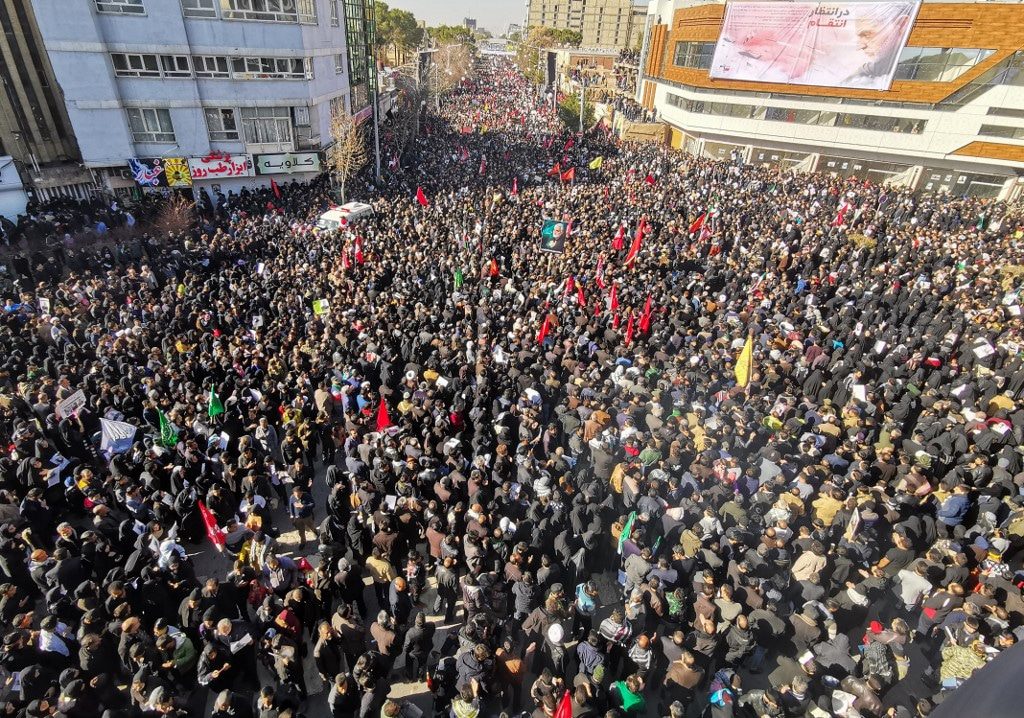
When President Donald Trump announced the assassination by a US airstrike of General Qassem Soleimani, commander of Iran’s elite Quds Force, on 3 January 2020, he might have had an Iranian reaction in mind but not widespread anger.
Seen as an act of war, Soleimani’s death in Baghdad, Iraq triggered a dramatic escalation in tensions between Iran and the US. Almost all Iranian officials and millions of protestors called for ‘hard revenge’.
Hours after the assassination, Iran’s Supreme Leader Ayatollah Ali Khamenei said that revenge awaits. The Supreme National Security Council also announced that revenge was imminent and placed the repercussions on Trump’s shoulders. Lieutenant General Hussain Salami, commander of the Islamic Revolutionary Guard Corps, indicated that Iran would take decisive reaction. Iran’s president, the minister of foreign affairs and Soleimani’s deputy, who quickly replaced the slain commander, all made similar declarations.
In understanding this public response, it is important to take into account how Soleimani is viewed within Iran. Since the eight-year Iran-Iraq war in the 1980s, Soleimani has fought in many of the country’s major military operations, playing an important role in the outcome. He was appointed head of the Quds Force in 1999. It was within this – at the time marginal – force that he rose to prominence. His efforts vis-à-vis the US occupation of both Afghanistan and Iraq and his involvement in the defeat of the Islamic State in Iraq and Syria (IS) made him a national hero at home.
Besides proving himself as a soldier and military leader, the fact that he worked with all administrations and political factions, supporting what he saw as a national struggle to defend Iran’s security and integrity, added to his popularity.
When news broke of his assassination, popular anger was swift. On 8 January, Iran retaliated by firing missiles at two US bases in Iraq. Although no one was hurt and Trump announced that the US would not respond militarily to the strikes amid signs of a de-escalation on both sides, Iran’s response – unprecedented in four decades of Iran-US hostilities – has brought new dimensions to the already tense relationship. These can be summarized according to three main themes.

Firstly, the political and diplomatic breakthrough Trump was hoping for with Iran is now as far away as ever. Some Iranian politicians had hinted at the possibility of dialogue with Washington, arguing that Trump is after a diplomatic win and if Iran gives him what he wants, he will in turn give Iran more than Obama ever did. Following the assassination, opponents of dialogue gained the upper hand and no one challenged them. They also feel emboldened by the widespread anti-US sentiment. Any change in these dynamics in the coming years appears unlikely, especially if Trump remains at the helm in the US.
Secondly, the Iranian missile strikes in Iraq seem to have been a reaction to the public outcry rather than a proportional response to the assassination. After all, Iran wants to avoid a war with the US. However, those who understand Soleimani’s position within the Iranian military and political structures, know that the scars are far from being healed. The assassination crossed all the unwritten Iran-US red lines. As a result, a change in how Iran deals with the US is expected. The Supreme Leader signalled this shift when he called the missile strikes ‘a slap’ and said that the real revenge would be expelling the US from the region. Heightened tensions are expected as a result of this shift.
Thirdly, US officials have always considered ordinary Iranians as a strategic asset that should be taken into account in any policy on Iran. Soleimani’s assassination dealt a serious blow to that policy. Although Trump’s so-called ‘maximum pressure’ campaign against Iran has worsened the US’ image in Iran, the assassination of a national hero successfully destroyed Iranians as a strategic asset for years and maybe decades to come.
Clearly, Soleimani’s death elicited a reaction Washington did not expect. Not only did it mend political divides over the way Iran deals with the US, it also turned Iranians from all walks of life against the US, further benefiting the establishment. Even Washington’s latest sanctions on Iran, seen as a face-saving measure following the strikes on US troops in Iraq, will help Tehran when it comes to bolstering anti-US sentiment.


